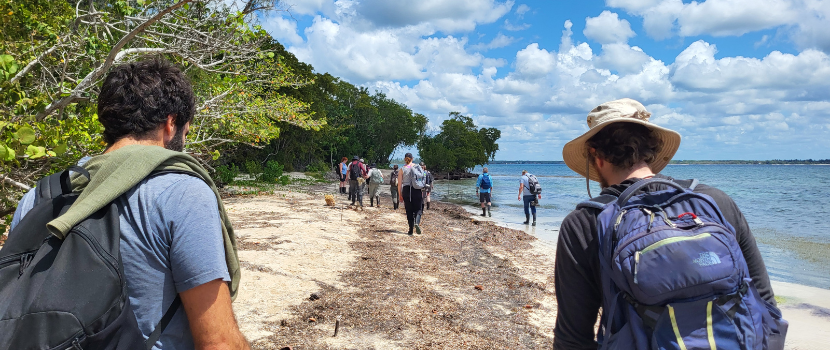SASKATOON — Fifteen Sask Polytech students engaged in unique hands-on learning in a rich and diverse tropical ecosystem while travelling through Cuba. Hosted by CELEI Regenerative Education, the participants expanded their knowledge through tours and talks and became the first international delegation to work with Cuban governmental organizations in the Cienega de Zapata National Park, a UNESCO World Heritage Park.
Students in the Agriculture and Food Production program, Environmental Engineering Technology program and Integrated Resource Management (IRM) program participated in the exchange last spring.
The mangrove forests and coral reefs proved to be highlights for students as they learned about practical, on-the-field adjustments to protect and maintain the natural tropical environment. IRM instructor Lorne Renouf explains the Sask Polytech students had the opportunity to gain hands-on experience as they came together with the goal of removing 60 invasive trees but ended the day having removed twice as many.
“Lots of students say they want to do environmental work, and they got to see its importance and impact throughout Cuba. Down there, people are living it and breathing it. Many are very concerned about their ecosystem. They didn’t have things we take for granted like access to chainsaws or drills. The park staff used machetes,” Renouf says. “They’re so passionate about caring for the environment."
In addition to the national park, students and instructors toured the Viñales Valley, a UNESCO World Heritage Site recognized for its traditional methods of agriculture. Environmental Engineering Technology instructor Dwayne Donald also accompanied the group on the global learning experience.
“We had the opportunity to visit a different ecosystem than the ones we traditionally deliver programs in, so the chance to experience that was important,” Donald says, “But more so, the experience enabled students to understand challenges faced in Cuba related to some of the decisions and choices made in forest management and agricultural production due to limited resources. That was a great eye opener for them.”
In addition to removing invasive species, the group also learned about reforestation efforts in mangroves. A recent Environmental Engineering Technology program graduate, Adam Greuel explains how the process stood out to him.
“In Cuba they take small seedlings that are just getting established from the mangrove. I was fascinated to learn that the seeds sprout when they are still attached to the tree and then fall, like weighted darts and punch into the mud below the mangrove where they root and become a tree. They take the seedlings from where they have landed and spread them out into sunnier areas to effectively spread the mangrove into areas where they lost their foothold to an invasive species," he shares. “It was really inspiring to see people spend their time getting a forest back on its feet.”
Participant Aiva Bieber capped off her first year in the Agricultural Food Production program with the international experience.
“I chose to apply for the study abroad opportunity because I’ve never travelled the world before, and I really wanted to visit Cuba in a way where it was more of a learning opportunity rather than just being a tourist,” she shares.
Karsen McLachlan, a recent graduate of the IRM program agrees.
“I couldn’t think of a better way to travel to Cuba. You hear about resorts, but we got to stay with families in communities. It was so amazing to go to the UNESCO parks.”
In the parks, students learned about animals who call the water home, such as turtles, alligators and Cuban gar fish, an endangered species. Learning about the fish was a particular highlight for McLachlan.
“It expanded my interest in pursuing further education. It was really cool to see Cuban gar fish at all stages of life. Experts are trying to preserve this prehistoric fish population. I was already interested in fisheries, so this experience added to that,” McLachlan notes.
Immersion in Cuban communities came from a variety of experiences. A particularly joyful moment happened when the group came together with locals to clean a beach, play games and have a party. These social interactions had a profound impact on students and instructors alike, shares Donald.
“Going down there I thought the goal was introducing students to a new ecosystem, talking about environmental management, meeting with farmers, volunteering and having a positive impact,” he says. “Coming back, I realized the social learning component was more rewarding than I expected. We spent a lot of time not only working on ecology, but also interacting with local people and building relationships that will have a deep and profound impact on our students long-term. Students came away with life-changing knowledge. Some of them are going to be different people going forward because of the two weeks they spent in Cuba.”
Bieber notes, “I’m really grateful for this experience. This opportunity has inspired me to travel more. With my passion for agriculture, what I’ll take back from this trip is to restore the land and keep it going for many generations in the future. We did a lot of regenerative work in Cuba, and that’s something I think is very important in Canada.”
Adds, McLachlan, “I hope this trip continues to be part of the IRM program. It greatly enhanced the education we had already received. It lets students know there’s so much out there.”
The trip was funded by Employment and Social Development Canada’s Global Skills Opportunity program, which aims to empower post-secondary institutions to increase the participation of Canadians in international learning opportunities — especially Indigenous students, students with disabilities and those from low socio-economic backgrounds who have traditionally faced barriers to participation.
Learn more about Sask Polytech’s global learning experiences.
— Submitted by Sask Polytech Media Relations




